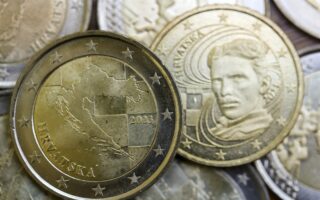Dimitra and Persephone

Walter Heller, an economist who served in the Kennedy and Johnson administrations, used to quip that “an economist is a man who, when he finds something works in practice, wonders if it works in theory.” Yanis Varoufakis, Greece’s former finance minister and now leader of the MeRA25 political party must be a great economist considering that he wants to replace the euro, a currency which actually works, with his Dimitra blueprint that only exists in theory.
Truth is there is a big theoretical debate about the role of currencies in the economy, which has gained additional interest now that the operation of banks is governed by fewer rules than in the past. The liquidity produced by central banks is several times smaller than that produced by private credit. In the past, this extra liquidity was defined by law as a multiple of the banks’ state-held liquidity, which refers to their reserves. However, with deregulation, this restriction was removed, resulting in a significant increase in liquidity.
Varoufakis likes to talk about a “public system of free digital transactions,” which already exists with digital cryptocurrencies, but the leader of MeRA25 also lends it a revolutionary tone. In comments made to the Voria.gr website on May 1, Varoufakis said, “It is necessary even in conditions where there may not necessarily be an international banking crisis – as the case is again today – or in conditions where we may not necessarily need to confront the leadership of this EU – as is still required for our country to become sustainable.”
It should be noted that at the end of the day, a country with such a trade balance needs a lot of money to be able to repay its creditors
However, such a system was in place before the crisis, but it did not save us. It was not digital, but thousands of businesses were conducting transactions (and creating additional liquidity) through bills of exchange and checks. During the crisis, this parallel currency, as it were, proved to be toxic. Healthy businesses were left with checks in hand. They went bankrupt regardless of their good financial results.
A system of parallel and unsecured transactions like this only works in good times, so Dimitra should probably be renamed Persephone. It should be noted that at the end of the day, a country with such a trade balance needs a lot of money to be able to repay its creditors. Even if digital alternatives were to be established that were extremely reliable on the domestic market, they would not be enough.
There is a problem with the exorbitant fees that banks charge for digital transactions, and the discussion about digital currencies is interesting. Varoufakis has chosen the worst way to introduce the topic into Greek public dialogue – and we don’t just mean his tone.





